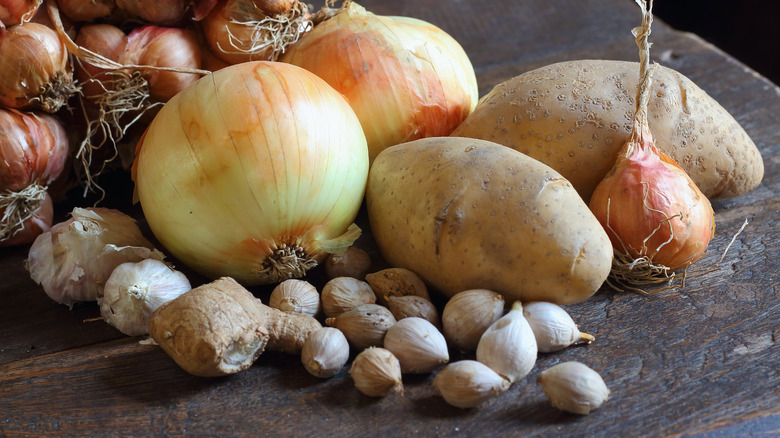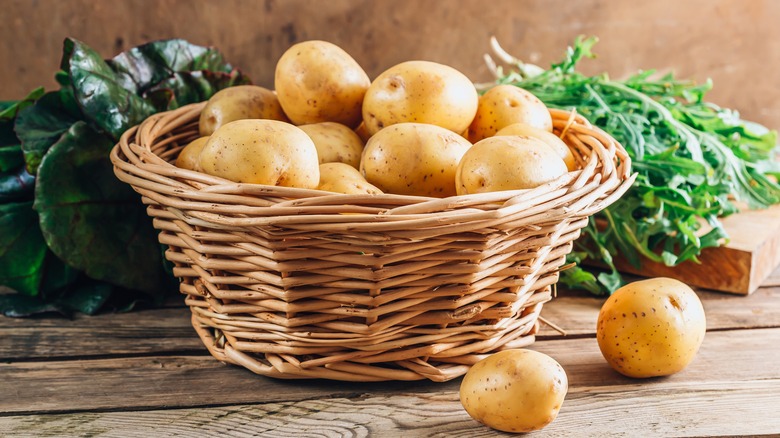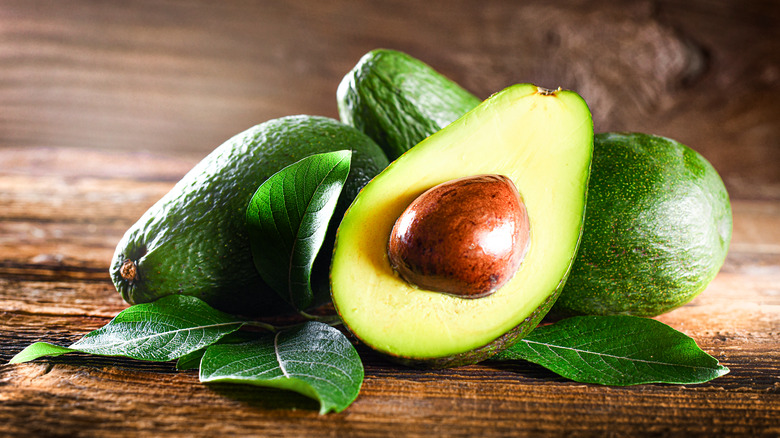Why You Shouldn't Store Onions And Potatoes Together
When we think about items we purchase from the produce section in the store that have a long shelf life, potatoes and onions are some of the first that come to mind. Properly stored, they can last for months without signs of decline. But beware, though these items can generally stand the test of time in your pantry or refrigerator, storing them together can cause them to rot faster.
The humble onion, one of the most versatile culinary staples that exist, produces ethylene — a gas many fruits and vegetables emit that encourages the ripening process — that, for already-ripe tubers, means decay. Potatoes, in turn, have a high moisture content, which for cured onions, reintroduces unwanted moisture that promotes spoilage, and will turn them brown and soft. They don't get along until you put them together in a dish.
These pantry staples are best stored in similar ways, which is why some think keeping them together makes sense. However, there are subtle differences between the ideal storage methods for optimal shelf life and quality. Keeping them at least a few feet away from each other is just the first step.
How to best store potatoes and onions
Potatoes are best stored somewhere breathable, like a bowl or basket in the pantry. If in a mesh bag — as potatoes are often packaged — they should be fine to keep hanging somewhere, as long as they aren't overcrowded. You never want to store potatoes in the refrigerator because the cold temperature can cause the starch inside to convert to sugar, which will affect how they taste.
Like potatoes, yellow, white, and red onions are best stored in cool, dry places. They can be stored in the fridge, but it will reduce their shelf life to about a week or two. Sweet onions, like Maui and Vidalia, have a higher moisture content than their relatives, which makes them spoil quicker; ideally, these onions should be kept in your fridge wrapped in a paper towel to maximize shelf life. Both onions and potatoes are best kept in dark places; direct sunlight will turn potatoes green, and in onions, promote moisture, which encourages mold growth.
Ethylene isn't a bad thing; it contributes to our fruit and veggies being as delicious as possible. It's just not something that potatoes should come into contact with for quality purposes. And with a little human ingenuity, we can use this phytohormone to our benefit. If you ever come home from the grocery store with unripe fruit, ethylene can be your best friend.
Ways ethylene can work for you
While you want to be mindful about storing certain fruits and veggies together, occasionally you can work this to your advantage. While it's not typically the case for onions or potatoes, other produce might be on the wrong side of ripe, and ethylene can speed up the process. If you've got some avocados lying around waiting to be just right, speed up the process by placing them in a paper bag with another ethylene-producing fruit, like a banana.
The bag will trap the ethylene the avocados are giving off, and it will help them ripen faster. The same trick works with tomatoes, bananas, peaches, and other stone fruits. Any paper bag will do, but plastic bags won't have the same effect. They will trap the ethylene, but because they're not as breathable as paper bags they will also trap moisture that will promote spoilage.
Onions and potatoes can last for months without losing their allure if they're stored properly. If you have noticed your spuds aren't lasting quite as long as they should lately, double-check your storage method. By making a quick adjustment in your pantry, you can get the most out of your tasty tubers and onions in your next meal.


